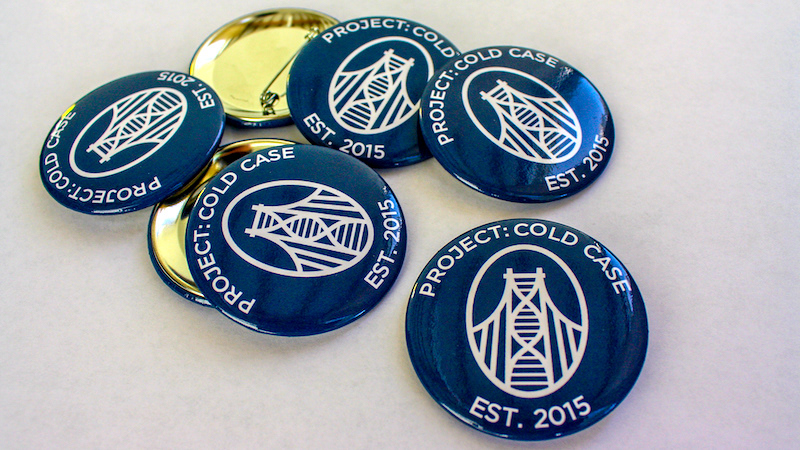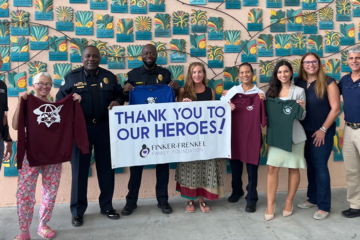Partner Profile: Project Cold Case

Founded by Ryan Backmann in 2015, Project: Cold Case is a nonprofit organization that works to put a spotlight on unsolved murder cases, and creates a supportive and understanding community for the family, friends and loved ones of victims. The organization’s grant funding thus far has been Florida-based, limiting its reach to cases and families in the state. Recently, however, the Finker-Frenkel Family Foundation presented Project: Cold Case with a grant to expand its reach to cold cases and victims’ families throughout the US.
When Ryan Backmann got a call from the Jacksonville, Fla., police on Oct. 10, 2009, he had no idea that his life was about to change forever.
“I thought maybe there had been a car accident, maybe my mom had a broken ankle or a broken rib,” he recalled. “In that moment, that was the worst thing I could think of.”
But when the two plainclothes officers arrived at his house, they delivered sobering news: There was no accident. His father, Cliff Backmann, had been murdered.
Backmann’s father, a construction worker who worked two jobs, had been at work on a Saturday afternoon when he was shot and killed in broad daylight by an unknown assailant. A decade later, his death remains unsolved, but detectives believe his murder was a crime of opportunity – his killer saw him working alone, walked inside and shot him to take his wallet. He spent the last seven minutes of his life on the phone with a 911 operator, trying to describe the man who killed him.
The news sent Backmann’s life into a tailspin. At the time, he was a project manager at an architectural firm that was decidedly not understanding of the grief and pain associated with losing a loved one to murder. A few months after his father’s death, Backmann was let go from his job.
“I was at a real low point,” said Backmann. “I’d lost my dad, my job, and my plans to start a family with my new wife [their second anniversary was just a few days after his father’s murder], had been thrown into turmoil.”
The same week he lost his job, Backmann was invited to attend a support group for families of murder victims hosted by a Jacksonville nonprofit. What he heard that night changed his life for a second time.
“I was surrounded by people who lost children to murder, and that put my pain into perspective,” said Backmann of the support group. “These people were inspirational: They had somehow survived losing a child and were still contributing members of society. They went to work every day. They were not curled up in a corner.”
Motivated by the strength shown by the other members of the group, Backmann began to volunteer with the organization and eventually was brought on as a full-time victims’ advocate. For four years, he sat alongside other families of murder victims in court and support meetings, organized events for kids who had lost loved ones to homicide and developed a deep passion for helping others.
In 2014, as the founders of the nonprofit he worked for began to consider retirement, Backmann and his wife decided to start their own organization focused on unsolved murders, and in 2015, after spending months working out of his living room while his infant daughter slept, Project: Cold Case was born.
“When you’ve lost somebody to murder, you’ve been stripped of a lot of your control,” said Backmann. “The investigation’s out of your control, the amount of evidence that exists is out of your control, whether witnesses are willing to cooperate is out of your control, and you can feel a lot of helplessness.”
By providing a way to get unsolved cases back into the public eye, Project: Cold Case helps to give families and loved ones of murder victims back some of that lost control. Both families and law enforcement can submit cases to the website to be publicized, and the organization also works to bridge the gap between grieving families and the police officers who are working to solve each case.
“We have partnerships with local news stations, and they do stories regularly on some of the cases submitted to us, and we set up regular meetings with detectives, so sometimes the families are able to get answers they need,” said Backmann.
Additionally, with the help of private donors like the Finker-Frenkel Family Foundation, the Project: Cold Case team has created a database of more than 23,000 unsolved murder cases around the country and has recently launched a cold case resource fund that helps to pay for private-lab evidence testing that can help to bring murderers to justice.
Backmann said the Foundation’s generous donation will go a long way in helping families around the country find peace and community.
“We use private donations like the Finker-Frenkel’s to provide real, direct services to victims,” said Backmann. “For example, we want to create multimedia spotlights, short videos that tell each victim’s story to share on social media. That takes time and money, and this kind of contribution, partnership and commitment opens up the real possibility of helping to solve cases.”
For now, Backmann remains proud of the community he has created.
“This is not a club that anybody wants to be a part of, but once you become a member, you’re so happy there are other people in it,” he said. “This is just too much to handle on your own. That’s what we wanted to provide — a safe place where people could express their frustrations and anger among friends.”



1 Comment
Virginia Culpepper · October 24, 2019 at 3:41 am
Thank you for all the things you’ve done for all our families of our love ones unsolved murders.God Bless ! Still praying for Justice for Rickey Herriage & all unsolved murders.
Comments are closed.